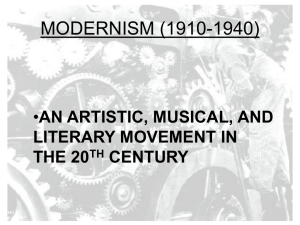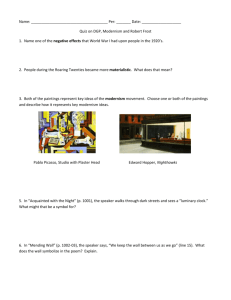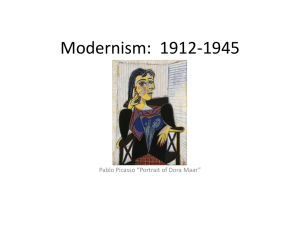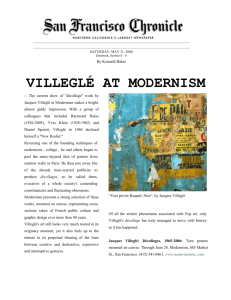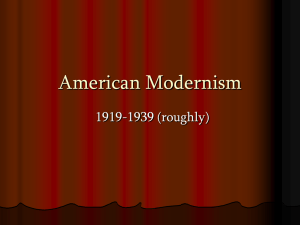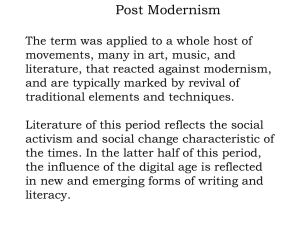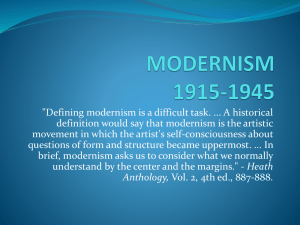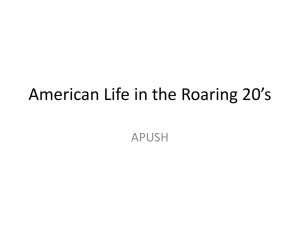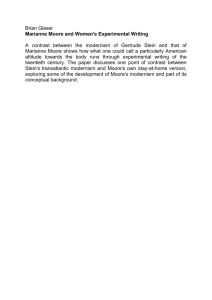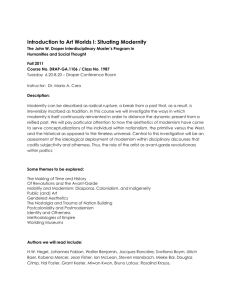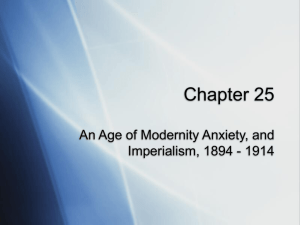Modernism - A2EnglishLearningCommunity2010
advertisement
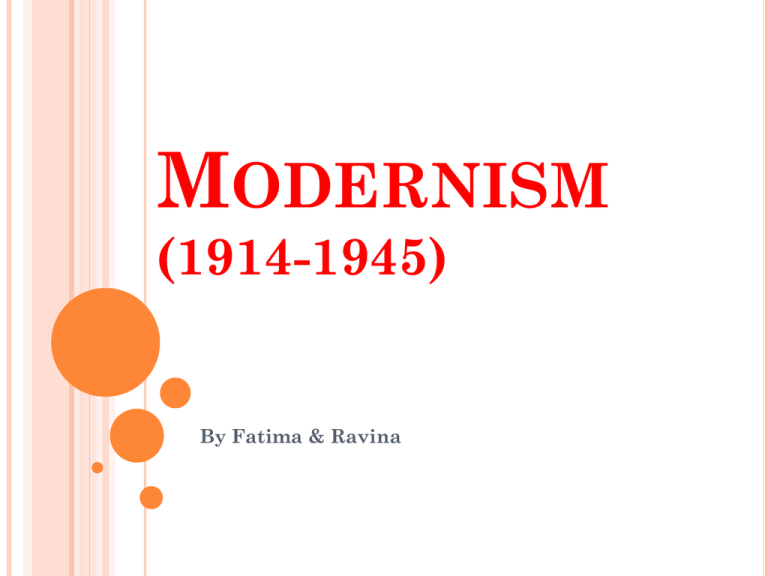
MODERNISM (1914-1945) By Fatima & Ravina WHAT IS MODERNISM? Modernism is used to describe a movement of which was established during the 1900’s and refers to the act of, “thinking outside the box” thus evidently symbolising modern thinking. It is also used to describe the start of leaning away from the more traditional teachings and aspects of art, architecture, literature and music. WHAT INFLUENCED MODERNISM? As with any period in time there were multiple factors that changed the mindset of many people and the way things were perceived, this allowed them to develop as a collective and move forward from what would be suggested as being more ‘traditional’ ideologies. WHO WAS WRITING AT THAT TIME? THE WORLD WARS o People had witnessed and became aware the horrors and brutality of war, leading people to question how the world really was. In terms of whether an almighty and benevolent being was really in existence. Led to less theological thinking and more rational and logical thinking This affected the mindset of people and allowed for a more broader range of thinking to be established. Structure of literature has since been changed. EXAMPLE OF HOW LITERATURE HAS BEEN INFLUENCED; WILFRED OWEN “His hanging face, like a devil’s sick of sin, If you could hear at every jolt, the blood come gargling from the forth-corrupted lungs” - o Extract from Dulce Et Decorum Est It is apparent that literature had taken a dramatic turn, as exhibited by Wilfred Owen’s poetry of which is known predominately for it’s graphic detail and horrifying imagery. - It was becoming increasingly apparent that life was not sunshine and butterflies and this pessimistic frame of mind and way of thinking was becoming more and more common. MAIN THEMES alienation frustration disillusionment rejection of history rejection of outdated social systems Two World Wars' effects on humanity People starting to question everything “ THE LOVE SONG OF J. ALFRED PRUFROCK” T.S ELIOT And the afternoon, the evening, sleeps so peacefully! Smoothed by long fingers, Asleep … tired … or it malingers, Stretched on the floor, here beside you and me. Should I, after tea and cakes and ices, Have the strength to force the moment to its crisis? But though I have wept and fasted, wept and prayed, Though I have seen my head [grown slightly bald] brought in upon a platter, I am no prophet—and here’s no great matter; I have seen the moment of my greatness flicker, And I have seen the eternal Footman hold my coat, and snicker, And in short, I was afraid. ANALYSIS OF MODERNISM TEXT Written in the form of a dramatic monologue Time frame – shows loneliness and frustration Biblical reference – rejection of history Past references to history Less solid chunk of stanza, exploring different ways Structure showing the build up of tension and then the small stanzas show the outbreak INDUSTRIALISATION Due to the world becoming more industrialised and revolutionised this had an impact on the way people thought Less traditional methods were being used. For example, in terms of agriculture there would have been no point doing things manually as there was now machinery to take it’s place. o Led to people becoming more open to change this led to a drastic change in many things. MODERN ART HOW DID INDUSTRIALISATION AFFECT LITERATURE? Industrialisation largely affected the world and our way of life The world was becoming far more developed and this was displayed through literature. The huge growth in technology allowed people to become far more open-minded and adapt well to change and this aspect of being able to think in a more broad sense allowed people to also become self-conscious. SIGMUND FREUD This era had seen the rise of psychologists such as Sigmund Freud who is famous for his innovative approach to things. He introduced the concept of Individualisation Thinking in terms of being your own person as opposed to becoming part of a collectivist culture. HOW DID INDIVIDUALISATION AFFECT LITERATURE? The ideology of individualisation led to the “stream of consciousness” literary technique being developed and writers had become more selfaware then they were previously and allows one to portray your own individual point of view. Focuses on the character’s subconscious and conscience. OLD POSSUM’S BOOK OF PRACTICAL CATS http://www.youtube.com/watch?v=LNCbharr18U o Shows the similarities between human and feline characteristics exploring the human form stream of consciousness.
